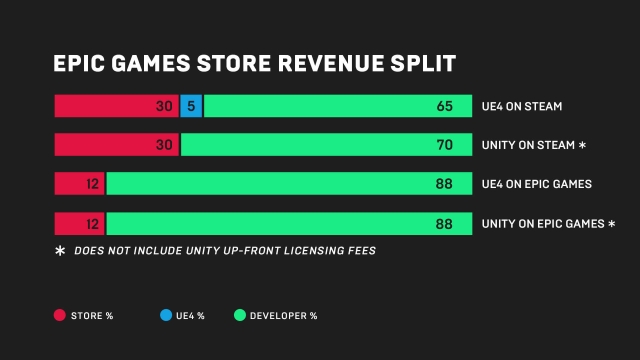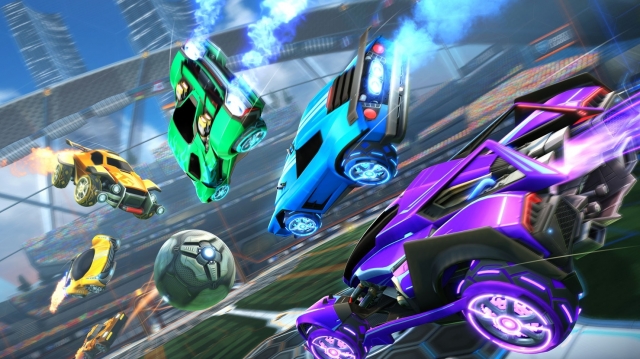
A Dream of Stores: Why This is Just the Beginning of the PC Storefront War
As Game of Thrones nears the end of its run, an alternative, modern threat to a very different throne is beginning to take hold. This one doesn’t preside over seven kingdoms on a grand iron throne, instead its deep blue logo resides on millions of PC gamers’ taskbars all over the world.
Over time, PC enthusiasts have had to live with a growing number of extra icons living alongside that of stalwart Steam. EA’s Origin, which began life as a universally loathed, unnecessary and buggy client is now in its period of acceptance. Personally, I actually don’t mind the funky little orange logo. Orange always was my favourite colour. Ubisoft’s uPlay remains generally disliked, but thankfully they have retained their portfolio on Steam.

The biggest controversy of all, though, has arisen from Epic Games. Their new launcher was revealed on 4th December 2018, bringing with it a much more favourable revenue share for publishers and developers compared to what Valve offers on Steam. For the vast majority of publishers, a 30% cut is taken by Valve for every sale. It reduces as you get over the $10 million mark, or perhaps other negotiated factors. Whereas on Epic’s store, that is reduced to 12%, bundled with free access to the Unreal Engine.
This was lauded by many as fantastic news for the PC gaming community; bringing choice to the market, with hopes to drive further “innovation” in the marketplace. That is, if innovation includes poor security, privacy issues and “bribes”.
You see, rather than Epic letting their store grow organically, they have taken the decision to inject large amounts of capital into various projects, in turn for their exclusivity to the Epic Games Store, completely eroding the “choice” argument the community wanted. There is no choice in exclusivity. Metro Exodus was the first high profile title to sign into Epic’s deal, removing itself from Steam mere weeks before general release. As you will probably remember, this did not leave many best pleased.

Epic have continued this trend, taking what I can only presume it thinks will be (or are currently with the likes of Rocket League) successful and high profile games to their own store, these cash injections paid for by the wildly successful Fortnite.
But can we be surprised? In fact, is it not a little surprising that this hasn’t happened before? Or did we just need a company like Epic, not with a large library that EA or even Activision, to try to replicate what Valve has done?
We can see the same thing happening outside of games, particularly with video streaming. A few years ago, Netflix was the go-to. It got the most movies, the most TV shows, and started creating some high quality original content, such as House of Cards (ending notwithstanding). Now, though, that trend is beginning to reverse. Disney’s own introduction of its streaming service has seen Netflix cut ties completely with its Marvel shows, Amazon Prime Video and even Hulu now have a wide array of the content that used to be Netflix’s MSP.
Even those two may have rocky futures with content creators now preferring to run their own subscription services, rather than selling their shows onto others. At least Hulu is owned by NBC and Disney.

This is the parallel that we’re seeing with PC games. Of course, EA’s Origin was introduced in 2013, but to begin with they were only interested in having their own games on their own store. That selection is wider now, however they’re not paid exclusive titles. Activision have moved their own games over to Battlenet, Microsoft has the Windows Store (although Halo will be making a rare appearance on Steam), and even Bethesda now has their own storefront.
In the future, I don’t see any kind of reduction to these clients. In fact, I foresee the introduction of further launchers before the end of this year. If your customer base wants a game, I would suggest that the actual amount of those who won’t purchase it based on the storefront is fairly low. It’s a difficult stat to effectively measure, although Epic were happy to announce that Metro Exodus sold 2.5 times higher than Last Light, throwing doubt into the wind that perhaps the “boycott Epic” plan hadn’t worked. Some had grievances with this, however.
Who will win the battle of the PC game launchers? The Epic Store certainly has not been graced with a truly positive introduction, so it will be interesting to see where it goes from here. Choice is good for the market, but exclusivity deals with shady business intelligence tactics will keep customers wary of any product. Publishers want to reduce costs and maximise revenue, so removing an up to 30% revenue cut is particularly attractive (obviously you need to develop a functional client first).
I don’t see Valve’s stranglehold moving anytime soon. But I do see more competition on the horizon.
Maybe one day we’ll need a launcher to launch our launchers.










COMMENTS
GarySheppard - 01:42pm, 18th May 2019
For me though, the difference is that with streaming media you have to pay a subscription, so it's prohibitively expensive to use them all. With stores, that's not the case. There's nothing to stop me using Steam, Uplay, EGS, Origin, GoG and Nutaku all at the same time. Exclusivity doesn't stop choice unless you choose not to use one store.